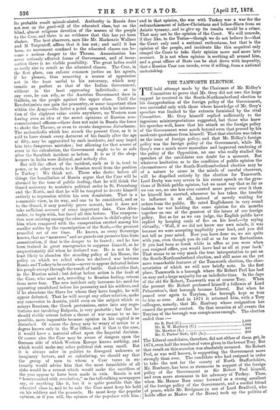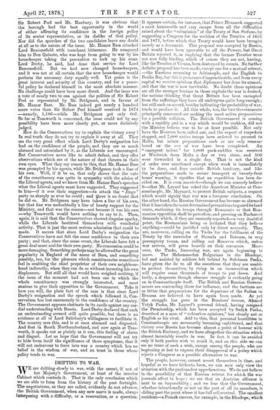THE TAMWORTH ELECTION.
THE bold attempt made by the Chairman of Mr. Ridley's Committee to prove that Mr. Grey did not owe the large support he received in the South-Northumberland election to his disapprobation of the foreign policy of the Government, was successful only with those whose knowledge of Mr. Grey's speeches was limited to the extracts furnished by the rival Committee. Mr. Grey himself replied sufficiently to the ingenious misinterpretations suggested, but those who knew his speeches well, knew that his attack on the foreign policy of the Government went much beyond even that proved by his moderate quotations from himself. That that election was taken on the issue of foreign policy, and that Mr. Ridley's foreign policy was the foreign policy of the Government, while Mr. Grey's was a much more masculine and improved rendering of the policy of the Opposition, no one who really studied the speeches of the candidates can doubt for a moment. But whatever hesitation as to the condition of public opinion the circumstances of the South-Northumberland election may be of a nature to cause in the minds of careful observers, will be dispelled entirely by the election for Tamworth. Lord Derby was very severe in his recent speech on the gyra- tions of British public opinion, but we must say that as far as we can see, no one has ever exerted more power over it than he himself has exerted, whenever he has taken the trouble to influence it at all, instead of merely waiting for orders from the public. He rated Englishmen in very sound fashion for not holding the same opinion for six months together on one of the greatest of the issues of our foreign policy. But as far as we can judge, the English public have replied by heaping coals of fire on his head,—by saying virtually, Well, if we did not know our own minds, it was because we were accepting implicitly your lead, and you did not tell us your mind. Now you have done so, we are quite with you, even though you do rail at us for our fluctuations. If you had been as frank while in office as you were when you resigned office, you would have had us all at your back.' That seems to us very much the true interpretation to put on the South-Northumberland election, and still more on the yet more remarkable features of the Tamworth election, the char- acteristics of which we will now briefly note. In the first place, Tamworth is a borough where Sir Robert Peel has had an easy and a large majority for an indefinite time. In the days of the old Sir Robert, Tamworth was of course Tory. When the present Sir Robert professed himself a follower of Lord Pahnerston's, that borough became Liberal. But when he passed over again to Toryism, the borough kept as true to him as ever. And in 1874 it returned him, with a Tory colleague, namely, that Mr. Hanbury whose resignation has caused the present contest. On that occasion at all events the Toryism of the borough was conspicuous enough. The election
ended thus :-
Sir R. Peel (C.) 1,089
Mr. R. W. Hanbury (C.) 1,086 Mr. Hawkes (L.) 448 Mr. C. Parker Butt, Q.C. (L.) 209
The Liberal candidates, therefore, did not either of them get, in 1874, even half the number of votes given to the lowest Tory. But that result on this occasion was absolutely reversed. Sir Robert Peel, as was well known, is supporting the Government more strongly than ever. The candidate who had resigned in order to take the seat for the county of North Staffordshire, Mr. Hanbury, has been as strenuous in support of the foreign policy of the Government as Sir Robert Peel himself, and even more strenuous in his advocacy of Turkey. Thus, when Mr. Hamar Bass came forward as a strong assailant of the foreign policy of the Government, and a cordial friend of peace, while Mr. Bridgman (a son of Lord Bradford, who holds office as Master of the Horse) took up the politics of Sir Robert Peel and Mr. Hanbury, it was obvious that the borough had the best opportunity in the world of either affirming its confidence in the foreign policy of its senior representative, or its dislike of that policy. Nor did the speeches of the two candidates leave any doubt at all as to the nature of the issue. Mr. Hamar Bass attacked Lord Beaconsfield with trenchant bitterness. He compared him to Don Quixote, who was kept from going to war by his housekeeper taking the precaution to lock up his arms. Lord Derby, he said, had done that service for Lord Beaconsfield. But we had now changed housekeepers, and it was not at all certain that the new housekeeper would perform the necessary duty equally welL Yet peace is the great interest and security of this country, and for a peace- ful policy he declared himself in the most absolute manner. No challenge could have been more direct. And the issue was a vote of nearly two to one against the politics of Sir Robert Peel as represented by Mr. Bridgman, and in favour of Mr. Hamar Bass. Mr. Bass indeed got nearly a hundred more votes than Sir Robert Peel himself received in 1874 —namely, 1,186—while Mr. Bridgman got only 607. So far as Tamworth is concerned, the issue could not by any possibility have been more clearly put, or more decisively judged.
How do the Conservatives try to explain the victory away ? In real truth they do not try to explain it away at all. They see the very great effect which Lord Derby's resignation has had on the confidence of the people, and they are as much alarmed and astonished by it, as the Liberals are encouraged. But Conservatives never like to admit defeat, and they offer observations which are of the nature of dust thrown in their own eyes. What they say comes to this, that Mr. Hamar Bass was prompted by his agents, while Mr. Bridgman took a line of his own. Well, if it be so, that only shows that the vote of the constituency was quite in sympathy with the advice of the Liberal agents, and we know from Mr. Hamar Bass's speeches what the Liberal agents must have suggested. They suggested to him—if it was their suggestion—to attack the " Jingo" party as sharply as ever he could ; and there is no doubt that he did so. Mr. Bridgman may have taken a line of his own, but that line was undoubtedly a line of hearty support for the Ministry, and that was the reason—not because it was his own —why Tamworth would have nothing to say to it. Then, again, it is said that the Conservatives showed singular apathy, while the Liberals bestirred themselves with wonderful activity. That is just the most serious admission that could be made. It means that since Lord Derby's resignation the Conservatives have not felt the same confidence in their own party ; and that, since the same event, the Liberals have felt a great deal more zeal for their own party. No concession could be more damaging. Something perhaps may be allowed for the great popularity in England of the name of Bass, and something possibly, too, for the pleasure which constituencies sometimes feel in snubbing the chief proprietor of their own neighbour- hood indirectly, when they can do so without incurring his own displeasure. But still all that would have weighed nothing, if the issue of the moment had not been one in which the whole constituency was strongly interested, and most anxious to give their opposition to the Government. Take it how you will, the plain fact of the case is that since Lord Derby's resignation and the speech which followed it, Con- servatism has lost enormously in the confidence of the country. The Government appears obstinate in its cavils against any cor- dial understanding with Russia. Lord Derby declared that such an understanding seemed still quite possible, but there is no evidence at all of Lord Salisbury's willingness to facilitate it. The country sees this, and is at once alarmed and disgusted. And first in South Northumberland, and now again at Tam- worth, it speaks out as plainly as it can, this feeling of alarm and disgust. Let us hope that the Government will not try to hide from itself the significance of these symptoms, that it will not endeavour to force into war a country which has no belief in the wisdom of war, and no trust in those whose policy tends to war.



































 Previous page
Previous page